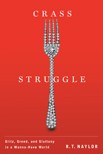While McGill economist R.T. Naylor certainly abhors the tastelessness of flaunted wealth, his new book, Crass Struggle: Greed, Glitz, and Gluttony in a Wanna-Have World, has a far more serious aim. Through almost overwhelming research, he reveals that the trappings of extreme wealth, far from being merely benign display, are often the products of a supply line that is rife with squalor, corruption, and criminality, and destructive to law, society, and the environment.
Crass Society is a brick of a book: 381 pages of text and 90 pages of notes, covering virtually every category of possession a rich person might covet: from gold and precious metals to jewels to fine art to antiquities to wine, ivory, exotic pets, even cigars. No indulgence of the privileged classes is safe from his scrutiny.
The depth of the research is staggering. We learn about not only the noxious technology for the industrial extraction of gold from ore, but also the numerous manipulations for turning a mediocre stone into a glittering gem. We learn how to doctor relics, stamp ancient coins in modern basements, adulterate wine, and mass produce old masters, all while taking advantage of tax incentives. If this weren’t an exposé, it could be a primer on how to be a successful con artist.

Crass Struggle
Greed, Glitz, And Gluttony In A Wanna-have World
R. T. Naylor
McGill-Queen's University Press
$29.95
cloth
471pp
9780773537712
Too bad then that much of the book is unreadable. The preface is a rant and there is virtually no narrative coherence to connect the research. The author bounces from incident to incident haphazardly, zigzagging from continent to continent and casually ignoring centuries to get to the next juicy morsel.
And where is the perspective? We never learn how industries, from gold mining to art auctioning to winemaking, are supposed to work legitimately. As Naylor presents things, every aspect of luxury-goods production is irredeemably corrupt and has never been otherwise. The author comes off like an army mess-cook. He gives you lots of stuff to chew, but you’re not sure what it is supposed to be. Worse, Naylor tries to compensate with sarcasm. Some is quite funny – e.g., “conniving cabal of crab fishermen,” “McSushification of [Japan’s] billionaire class” – but most is pointlessly caustic and directed toward “parasitocrats,” American neocons, and similarly easy targets. Other examples are silly, even bizarre: the ruler of Zaire is “president-for-life-who-is-now-dead Mobuto Sese Seko”; Jesus Christ is a “charismatic fellow with hair as long as a hip California vintner.” (And Naylor gets it wrong. Jesus didn’t dilute wine; he turned water into it.) Talking about fake collectibles, Naylor says this: “$2.87 … is probably the ‘fair market value’ of a signed first edition of a classic text by a University of Chicago economics professor who carried off his discipline’s ‘Nobel prize,’ something as genuine as a lot of other items traded on the collectibles market today.” The dig is at the late Milton Friedman. But why? Neither the man nor his work is mentioned anywhere else in the book.
This incoherence and pettiness seriously mar what could have been, in more disciplined hands, a deliciously entertaining romp. mRb






0 Comments